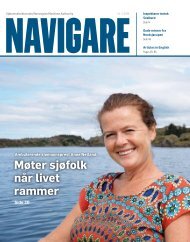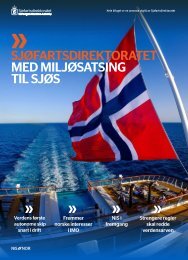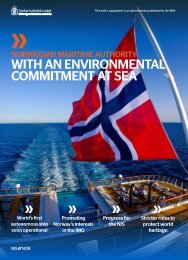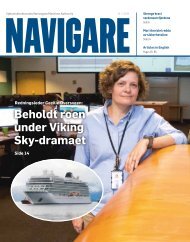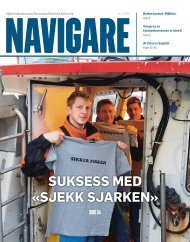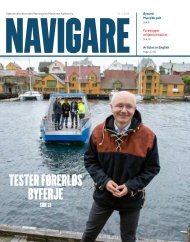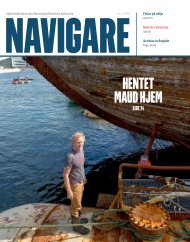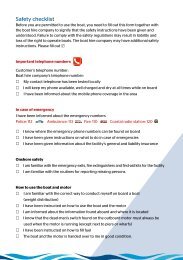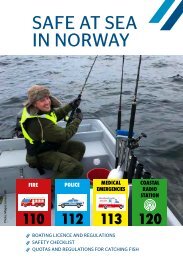Joining forces for our maritime future
The Norwegian Maritime Authority has strengthened its accessibility and service, and is now working with the industry to reinforce Norway's maritime sector for the future. A special Nor-Shipping 2015 publication from the NMA.
The Norwegian Maritime Authority has strengthened its accessibility and service, and is now working with the industry to reinforce Norway's maritime sector for the future. A special Nor-Shipping 2015 publication from the NMA.
You also want an ePaper? Increase the reach of your titles
YUMPU automatically turns print PDFs into web optimized ePapers that Google loves.
This entire supplement is an advertisement from the NMA<br />
PhD students prepare an experiment.<br />
Speed trial during the Ocean Space Race.<br />
Ocean space technology provides<br />
an ocean of job opportunities<br />
Norway is among the world leaders in marine science, technology and industry.<br />
About 40 per cent of value creation comes from the sea. Norway is<br />
an oceanic nation. New knowledge and innovative technology are needed to<br />
ensure the <strong>future</strong> sustainability of activities at sea and in the ocean space, and<br />
that will depend on involving today’s youngsters.<br />
The department of marine technology (DMT)<br />
at the Norwegian University of Science and<br />
Technology (NTNU) teaches and conducts<br />
research on methods and techniques which<br />
make it possible to evaluate and develop technical<br />
and operational solutions <strong>for</strong> the nation’s largest export<br />
industry. The MSc c<strong>our</strong>se in marine technology<br />
is a five-year programme with a common curriculum<br />
<strong>for</strong> the first two-and-a-half years, followed by<br />
one of eight specialisations.<br />
“Interest in marine technology studies is great and<br />
the level of applications high,” says professor Bjørn<br />
Egil Asbjørnslett at the DMT. “To help retain a leading<br />
world position in the subject, we want to motivate<br />
and recruit more students and organise the annual<br />
Ocean Space Race vessel design competition here at<br />
Tyholt in Trondheim,” adds professor and DMT head<br />
Harald Ellingsen. “We’ll be contributing this June to<br />
the Ocean Talent Camp outside Oslo City Hall.”<br />
Marine technology has traditionally been a male<br />
subject, but women accounted <strong>for</strong> about 45 per cent<br />
of last year’s student intake. The c<strong>our</strong>se also attracts<br />
many <strong>for</strong>eigners to the Tyholt campus, which is characterised<br />
by a good and vibrant international student<br />
community.<br />
Students building a ship model.<br />
Research<br />
The Centre <strong>for</strong> Autonomous Marine Operations and<br />
Systems (AMOS), a world leader in its field, is one of<br />
f<strong>our</strong> new NTNU centres of excellence. It will help to<br />
develop intelligent ships and ocean structures, and<br />
autonomous unmanned vehicles under water, on<br />
the surface and in air. Developments will also cover<br />
robots <strong>for</strong> high-precision and safety-critical operations<br />
in extreme environments. This is necessary in<br />
order to meet challenges related to the environment<br />
and climate, safe <strong>maritime</strong> transport, mapping and<br />
surveillance of large ocean and coastal regions, offshore<br />
renewable energy, fisheries and aquaculture<br />
as well as deep-sea and Arctic oil and gas exploration.<br />
The department also participates in several centres<br />
<strong>for</strong> research-driven innovation, including two together<br />
with Ålesund University College, which will<br />
become part of the NTNU in 2016.<br />
MSc graduates have a unique opportunity to become<br />
one of more than 100 PhD students in the department<br />
every year. Marine technology graduates enjoy<br />
an ocean of job opportunities in a varied industry.<br />
Ocean Space Centre<br />
“We now hope and expect that the government will<br />
give the green light <strong>for</strong> building the Ocean Space<br />
Centre as tomorrow’s knowledge hub in its field,”<br />
says Ellingsen. “The marine technology centre has<br />
been and is the largest civilian educational and research<br />
facility <strong>for</strong> this subject in the western world.”<br />
Asbjørnslett adds: “This will be extended with the<br />
Ocean Space Centre and carry Norway into the <strong>future</strong>.”<br />
www.ntnu.no<br />
29










